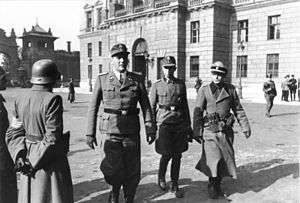Adrian von Fölkersam
Adrian Freiherr[1] von Fölkersam (Russian: Адриан Арминович Фелькерсам; 20 December 1914 – 21 January 1945) was a German Brandenburger and Waffen-SS officer in World War II.
Adrian von Fölkersam | |
|---|---|
 Otto Skorzeny (left), Adrian von Fölkersam (middle) and SS-Obersturmführer Walter Girg (right) in Budapest, 16 October 1944 | |
| Born | 20 December 1914 St Petersburg, Russian Empire |
| Died | 21 January 1945 (aged 30) Hohensalza, Poland |
| Allegiance | |
| Years of service | 1940–1945 |
| Rank | SS-Sturmbannführer |
| Battles/wars | World War II
|
| Awards | Knight's Cross of the Iron Cross |
Career
Fölkersam was born into an aristocratic Baltic German family with a long record of service to the Russian Empire. Fölkersam's family fled Russia after the Russian Revolution and settled in Latvia. From 1934 he attended university in Munich, Königsberg and Vienna studying economics, at this time he became a member of the National Socialist movement and the SA. Fölkersam joined the Brandenburgers in May 1940, forming a special unit comprising Volksdeutsche (ethnic Germans) of Russian origin. His unit was active extensively during Operation Barbarossa, and he even led an operation to capture the Maikop oilfields with his men dressed as an NKVD detachment.[2]
In 1944 Fölkersam's unit transferred to the Waffen-SS and became the major part of SS-Jagdverband Ost. This unit was active on the Eastern Front and took part in the kidnapping of Miklós Horthy, Jr. and the deposition of his father, the Hungarian regent Miklós Horthy in Operation Panzerfaust. During the Battle of the Bulge, Fölkersam participated in Operation Greif, and worked in close coordination with Otto Skorzeny.[3] In January 1945, having posted to the Eastern Front, he fought against the advancing Red Army in central Poland.[4] Adrian von Fölkersam was killed in action on 21 January 1945 near Inowrocław, Poland. At the time of his death, he was an SS-Hauptsturmführer (captain), and was in command of the SS-Jagdverband Ost.[5]
Awards
- Iron Cross (1939) 2nd and 1st Class
- Infantry Assault Badge
- Knight's Cross of the Iron Cross on 14 September 1942 as Leutnant der Reserve and adjutant in the Stab of the I./Lehr-Regiment z.b.V. 800 "Brandenburg"[6]
References
Citations
- Regarding personal names: Freiherr is a former title (translated as Baron). In Germany since 1919, it forms part of family names. The feminine forms are Freifrau and Freiin.
- Higgins, David (2014). Behind Soviet Lines: Hitler's Brandenburgers Capture the Maikop Oilfields 1942. Oxford: Osprey. ISBN 9781782005995
- Mortimer 2012, p.234.
- Mortimer 2012, p.235
- Mortimer 2012, p.235
- Scherzer 2007, p. 313.
Bibliography
- Mortimer, Gavin. (2012). Daring Dozen, 12 Special Forces Legends of World War II. Osprey Publishing. ISBN 978-1-84908-842-8.
- Scherzer, Veit (2007). Die Ritterkreuzträger 1939–1945 Die Inhaber des Ritterkreuzes des Eisernen Kreuzes 1939 von Heer, Luftwaffe, Kriegsmarine, Waffen-SS, Volkssturm sowie mit Deutschland verbündeter Streitkräfte nach den Unterlagen des Bundesarchives [The Knight's Cross Bearers 1939–1945 The Holders of the Knight's Cross of the Iron Cross 1939 by Army, Air Force, Navy, Waffen-SS, Volkssturm and Allied Forces with Germany According to the Documents of the Federal Archives] (in German). Jena, Germany: Scherzers Militaer-Verlag. ISBN 978-3-938845-17-2.